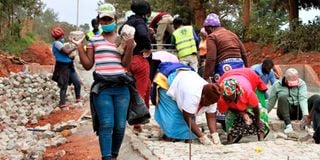Premium
Pay for no work can save nation

Youth under the Kazi Mtaani programme lay out cobblestones on a section of Mavoko-Mua road in Machakos County on August 17, 2020.
So where are the big, radical and fresh ideas to put the Kenya economy on a sustainable recovery path? On the presidential campaign trail, all you hear are predictable, repetitive prescriptions — mere mutations of boring tax and spend policies.
This society is suffering from an acute bout of low ambition. Does it surprise you that Deputy President William Ruto’s so-called bottom-up model is being touted as a fresh idea — floated as one of the economic policy choices and shifts we should consider as we approach the post-Uhuru Kenyatta Kenya?
The dismal and the low levels to which we have sunk in debating economic policy choices is astonishing. That bottom-up thing does not represent anything close to a paradigm shift in economic policy. It’s populism, stupid!
We’re not being given a properly worked out recovery plan with clear specifics. Where is the money to fund the bottom-up programmes to come from? Where is the map to guide investors on what the post-Kenyatta economy is likely to look like in terms of the level of public spending, inflation, interest rates, the exchange rate and productivity?
Clever political strategy
The bottom-up brigade are on a clever political strategy based on this logic: Throw as much red meat at the hoi polloi and lumpens as possible to deflect public discussion from concentrating on what ought to be the top economic agenda issues of the coming elections — grand corruption, persistent budget deficits, low production, low investments economy, massive jump in profit warnings by listed companies and widespread financial distress in public universities.
Bottom-up is the opium to distract us from focusing on the big grand corruption scandals: NYS, Covid billionaires, Kulalu-Galana, school laptops programme and Kimwarer and Arror dams.
Looking at the latest data on our external debt register, I was astonished to find that, we have a massive €705 million (Sh78 billion) debt on our books owed to Intessa Paolo Bank of Italy in respect of Kimwarer and Arror. The data shows that we will be paying these debts until November 19, 2035. Why are we paying billions for non-existent dams? Where did the billions we borrowed disappear to?
Raila Odinga’s idea of giving a Sh6,000 monthly stipend to the unemployed for doing nothing also reeks of populism. The reality we live with is that of diminishing tax revenues, crippling debt service obligations and the ballooning costs of pensions and wages.
Experimenting with the 4Us
Yet I still think that Mr Odinga’s proposal should get us thinking about how to refine and expand the cash transfer programmes and how to grapple with and experiment with the popularly growing idea of universal basic income.
During Mashujaa Day celebrations, President Kenyatta announced a new Sh10 billion allocation for Kazi Mtaani programme.
The world over, countries are experimenting with what is known as the 4Us: Universal health coverage (UHC), universal basic income, universal capital grants and universal pensions. Mr Odinga may have put it crudely but the concept of ‘money for nothing’ is fast gaining acceptance today as a feasible policy choice in the fight against poverty and inequality.
British Prime Minister Tony Blair experimented with universal capital grants way back in 2003. Both Norway and Finland have implemented versions of the concept. But what has made reward for no work even more fashionable is the experience with the coronavirus pandemic.
In the UK and the United States, the government spent billions on cash for no work schemes. In Spain, they launched a website offering monthly payments to poor families. Even here, the government has spent billions of shillings on cash transfers during the pandemic.
Four daughters
Allow me to give an example of a family I know. Deep in Mathare at a place called Gitathuru lives a single woman (name withheld) with her four daughters. She ekes out a living from selling leftover chicken legs and heads, which she buys on the cheap from butcheries to make a delicacy slum dwellers call “katakata” or “orenge”. She also makes another slum staple — an andazi called “KDF”.
During Covid, her business collapsed and the family found itself having to survive on cash transfers. The eldest daughter was registered on the government’s Covid transfer cash programme that paid her Sh1,000 every week. The second daughter was on a cash transfer programme by the Red Cross that paid Sh5,000 per month. The third was listed on a programme run by the charity Give Directly, which paid beneficiaries Sh2,000 every fortnight. The fourth girl enrolled for Kazi Mtaani and took home Sh5,000 after 11 days of work.
Let the presidential candidates tell us how we should approach cash transfer programmes and the 4Us. Covid has taught us that we can’t afford UHC and universal basic income.





